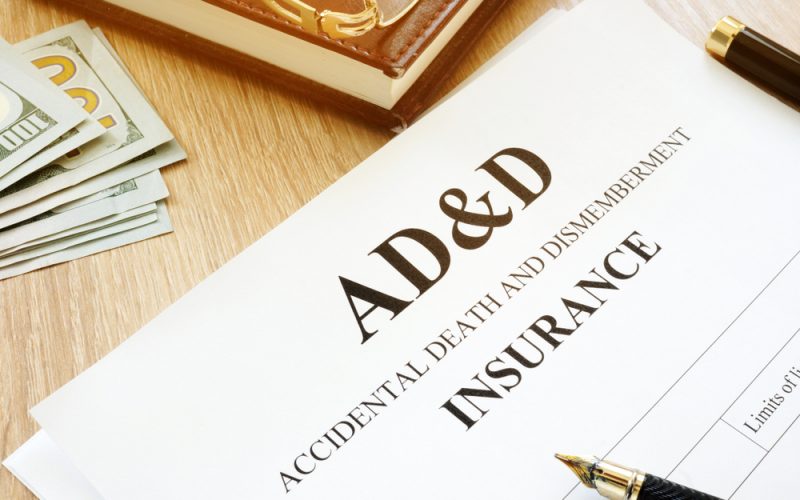Every day, the rates of death caused by accidents in America continue to increase, especially for individuals between the ages of 25 to 44.
This rise in accidental deaths raises a cause for alarm as there is a need to protect persons affected by this cause of death.
In America, the AD and D insurance policy covers these situations. This insurance policy provides coverage to the insured in the case of accidental death or dismemberment. Dismemberment includes the loss or the loss of the use of a part of the body, e.g legs, hands, etc.
To know if you should get the AD and D insurance, you need to have background knowledge of what its terms and conditions are.
Find out what it entails are you read through this article.
But first, let’s start with the basics.
What is AD and D Insurance?
The AD and D insurance, which stands for Accidental Death and Dismemberment Insurance is a special kind of insurance that provides benefits to an insured for situations like death caused by accidents or loss of limbs.
Normally, the AD&D insurance is added as extra insurance to a health insurance or life insurance policy.
For an insured to receive the benefit of AD and D insurance, the death must occur within a specified period and as a result of injuries sustained in an accident.
The accidental death and dismemberment insurance policy can help protect a family’s finances in the event of the loss of life or limb(s).
The types and extent of injuries covered are particular to and defined by each insurer and policy. AD&D insurance doesn’t cover death due to other causes such as sickness.
More so, AD&D insurance may pay a benefit that is 2X the regular insurance amount. However, this coverage comes with limitations so be sure to read the prints before buying.
AD and D insurance is limited and generally covers unlikely events.
READ MORE: Public Liability Insurance: Meaning, Quotes, Cost & Best UK Practices
How does Accidental Death and Dismemberment (AD&D) Insurance Work?
AD&D insurance contains a schedule that shows the details of the terms and conditions of the insurance. For example, if the insured dies as a result of injuries from an accident, the death must happen within a specific time before his/her family can receive the benefits.
Generally, AD&D insurance functions in case of accidental death or dismemberment. A more detailed explanation is given below.
#1. Accidental Death
In AD&D insurance, also known as “double indemnity”, the beneficiaries receive benefits if the insured dies as a result of an accident.
Generally, the benefits do not exceed a certain amount as stated in the policy. Most insurers determine this amount under the circumstance of the insured’s death.
Since most AD&D insurance policies are similar to life insurance, the beneficiary receives a benefit that is twice the amount of the insured’s life policy based on the face value of the insured’s accidental death.
Typically accidental deaths cover extreme circumstances such as exposure to toxic elements, death involving heavy equipment, homicide, falls, drowning, and traffic accidents.
It is important to note, that AD&D insurance is supplemental life insurance and should not be a replacement for life insurance.
READ MORE: Commercial General Liability Insurance CGL US: Policy, Coverage and Costs
#2. Dismemberment
In case of dismemberment – loss of a part of the body, e.g, limb, hand, eyesight, etc, most AD&D insurance pay a percentage sum of money.
The types and extent of injuries covered by the insurance are determined b the insurer and the policy. So, it is safe to say that it is not the same for everyone.
However, it is uncommon for a policy to pay 100% of the policy amount for anything less than a combination of the loss of a limb and a major bodily function, such as sight in at least one eye or hearing in at least one ear.
#3. Voluntary AD&D
Voluntary accidental death and dismemberment (VAD&D) insurance is an optional financial insurance plan that provides the beneficiary with cash if the insured dies in an accident or loses a body part.
It is less expensive than full life insurance and generally a limited form of life insurance. The amount paid by such a policy not only depends on the type of insurance bought but on the condition at hand.
For example, the policy may pay 100% if the insured is dead or loses most of his limbs. And can pay 50% if it’s just a loss of a part of the body.
AD and D Insurance vs. Life Insurance
Usually, lots of people try to replace life insurance for AD and D insurance. Although they are related, they still possess certain different conditions.
An AD&D insurance policy is not a replacement for a standard life insurance policy, but it does offer a payout under certain conditions and can provide you with valuable coverage.
More so, it differs from a standard life insurance policy because it is generally offered as a life insurance policy benefit rider or supplemental insurance.
So, while you can buy an AD&D policy by itself, it is more commonly added to another life insurance product.
More so, the AD&D benefit pays out an additional death benefit to your beneficiary that is above your current death benefit limit as stated on your life insurance policy.
For example, if you have a $500,000 policy with a $200,000 AD&D rider and you die in a tragic accident, your life insurance policy will pay out $700,000 to your beneficiaries.
However, if you die as a result of any other cause, the payout would be the limit of your life insurance policy, $500,000.
READ MORE: Financial Engineering: Programs and Salaries (Updated!)
Is Ad&D Insurance Worth Getting?
In the case of your demise or dismemberment, AD&D can assist in preventing financial hardship for you and your loved ones. If you are seriously hurt or killed as a result of a covered accident, it may be an economical way to complement your life insurance or health insurance.
Do I Need Ad&D if I Have Life Insurance?
You often don’t need AD&D insurance if you have appropriate life insurance. Term life insurance, for example, could give your family money to cover costs if you die away suddenly.
Why Would You Need Ad&D Insurance?
If you lose a limb or pass away as a result of an accident, accidental death & dismemberment (AD&D) insurance offers coverage. Term life provides coverage for more causes of death than AD&D.
What Does D&D Stand For?
Entertainment. The role-playing game Dungeons & Dragons are abbreviated as DnD (alternative spelling of D&D). A role-playing video game from 1975 is called DnD.
Can You Have Both Life Insurance and Ad&D?
A rider is an option if you want life insurance as well as AD&D insurance. A double-indemnity rider, commonly known as an AD&D rider, provides additional compensation in the event of unintentional death. Your coverage merely pays out the base amount if the death was brought on by natural causes.
Who Should Be Beneficiary for AD&D?
The beneficiary of your life insurance policy in the case of your passing may be anyone you want. If you pass away from a covered accidental injury, this also holds true for Basic AD&D Insurance and Voluntary AD&D Insurance.
Does Ad&D Cover Funeral Expenses?
Major expenditures like funeral costs and family members’ lost wages may be covered by AD&D Insurance.
What Counts as Accidental Death?
What Deemed an Accidental Death? According to insurance companies, an accident-related death is one that only results from an accident. Accidental deaths include those caused by motor vehicle accidents, slips, choking, drowning, industrial equipment, and any other uncontrollable circumstances.
AD and D Coverage
AD&D insurance covers a wide range of circumstances by providing a list of benefits to an insured person who has an injury that results in death, irrecoverable loss of vision in one or both eyes, and permanent loss of one or both hands or feet.
To be eligible for these benefits, the loss must be a direct result of an accident and must occur within a specific period from the day of the incident, which is generally 180 to 365 days.
Additionally, an AD and D insurance plan may include coverage for employees only or employees and dependents, which provides 24-hour coverage no matter where the covered accident occurs, whether at work, home, or away.
Conversely, there are some exclusions to the AD&D policy. They vary from insurer to insurer, hence the need for you to understand what the policy entails before embarking on it.
The exclusions to the AD&D policy include the following:
- Death from an illness, such as cancer or diabetes
- A drug overdose
- Suicide, or anything that happens as the result of mental illness
- Car racing, skydiving, or any other high-risk activity
- War and military injuries or death
- Driving while intoxicated
- Bacterial infections
- Death during surgery
- Death of a professional athlete during a sporting event
- If death happens while committing a crime
Understanding the AD and D insurance coverage enables you to review your options carefully before buying the coverage.
Accidental Death and Dismemberment (AD&D) Payouts
An individual is eligible to receive the benefits from AD and D insurance when he or she is accidentally injured or suffers dismemberment with no exclusion applied.
Additionally, if the insured dies accidentally or from injuries suffered accidentally, the designated beneficiary obtains the payouts.
In the AD and D Loss of One Limb Payouts Policy, there is a frequent cause of action, as the insured might insist that the injury is more serious, thereby requesting for a greater percentage of the AD and D insurance policy.
The insurer on the other hand will argue that the injury is less serious and offer to pay less or even none of the benefit.
In this situation, an experienced life insurance attorney would play a huge role by helping the insured gets paid what he or she deserves.
Every insurer will differ in the payout system, but generally, the policy will pay out 100% of its value in the event of the insured accidental death.
If the insured is dismembered, the policy will typically payout on a per-member basis. For instance, let’s say the loss of one eye might be worth a 25% payout, both eyes could be 50%.
The insured is advised to confirm the amount and circumstances with his or her provider to enable him or her to determine how the policy is structured to payout.
READ MORE: Private Wealth Management: Overview & 10 Best Private Management Firms
Accidental Death and Dismemberment (AD and D) Benefits
The most interesting part of the AD and D insurance is the benefits provided to an insured. In some cases, the AD and D insurance is an added benefit to an existing life insurance policy.
An accidental death not only impacts the surviving loved ones emotionally but also financially as they now deal with the sudden loss of income.
The AD and D insurance policy can serve as a nice supplement to term or permanent life insurance coverage. And additional benefits may apply, too.
First, the AD&D policy may provide living benefits compensation for injuries incurred due to particular types of accidents, like paralysis, loss of a foot, hand, leg, or arm, and blindness.
According to Insurance.com, If you lose one limb, you may qualify for 50% of your policy coverage amount.
If two or more limbs were lost, you may qualify for 100% of your policy coverage amount. Also, the amount paid to you as living benefits may not be deducted from your policy’s coverage amount, which may remain in full effect to help cover future injuries or death.
You may also qualify for up to triple payout on common carrier accidents.
Insurance.com further explains that, If you are injured or killed in an accident while riding as a fare-paying passenger on a bus, train, commercial airplane, ferry, cruise ship, taxi, or another type of common carrier, you may be entitled to double or even triple the coverage amount of your AD&D policy.
Note that some insurers provide an extra payout if you were wearing a seat belt during an accident that ended in death or injury.
READ MORE: Mortgage Brokers: How do Mortgage Brokers Make Money in the US (Updated)
Other Benefits of AD&D
Additional benefits may also be provided to help your children pay for higher education. Counseling, legal, and financial advice for beneficiaries may also be an included extra benefit for a surviving spouse.
Some insurers offer other optional benefits as part of an enhanced AD and D plan, too, including benefits for:
- Accelerated death
- Accident hospital income
- Adaptive home and vehicle
- Anti-inflation
- Bereavement counseling
- Coma
- Common disaster
- Critical burn
- Daycare
- Funeral expense
- HIV occupational accident
- Loss of use
- Newborn
- Newlywed
- Permanent total disability
- Rehabilitation
Advantages and Disadvantages of AD&D Insurance
Below are the pros and cons of the Accidental Death and Dismemberment (AD and D) insurance.
Pros
- AD&D insurance provides financial assistance in cases of accidental death or loss of limb.
- It is cheaper than the regular life insurance
- Supplements loss of income
Cons
- It is only beneficial in time of an accidental or severe loss of body part or bodily function.
- Gives a false sense of security if there is no life insurance policy in place.
- Terminates upon the insured’s termination and coverage.
READ MORE: IFRS (International Financial Reporting Standards) List, Requirements, Compliance & Benefits
AD&D FAQs
What is the difference between AD&D and Life insurance?
Accidental death and dismemberment (AD&D) insurance covers only death or the loss of limb or a major bodily function as a result of accidents. While Life insurance on the other hand pays death benefits upon the death of the insured regardless of the cause of death.
Is heart attack an accidental death?
Heart attack, just like cancer and other ailments is considered a natural cause of death. And will not prompt payment of benefits from the AD&D policy.
What does AD&D cover?
The Accidental death and dismemberment (AD&D) insurance policy cover death as a result of accidents at work or at home, loss of limb or a major part of the body, e.g eyesight.
Does life insurance and AD&D both pay out?
Yes, they do. Provided the condition of the insured is in accordance with the respective policies.
How much does AD&D insurance cost?
AD&D insurance is cheaper when compared to traditional life insurance. The rates vary according to the type of AD&D coverage as well as the insurer.
{
“@context”: “https://schema.org”,
“@type”: “FAQPage”,
“mainEntity”: [
{
“@type”: “Question”,
“name”: “What is the difference between AD&D and Life insurance?”,
“acceptedAnswer”: {
“@type”: “Answer”,
“text”: “
Accidental death and dismemberment (AD&D) insurance covers only death or the loss of limb or a major bodily function as a result of accidents. While Life insurance on the other hand pays death benefits upon the death of the insured regardless of the cause of death.
“
}
}
, {
“@type”: “Question”,
“name”: “Is heart attack an accidental death?”,
“acceptedAnswer”: {
“@type”: “Answer”,
“text”: “
Heart attack, just like cancer and other ailments is considered a natural cause of death. And will not prompt payment of benefits from the AD&D policy.
“
}
}
, {
“@type”: “Question”,
“name”: “What does AD&D cover?”,
“acceptedAnswer”: {
“@type”: “Answer”,
“text”: “
The Accidental death and dismemberment (AD&D) insurance policy cover death as a result of accidents at work or at home, loss of limb or a major part of the body, e.g eyesight.
“
}
}
, {
“@type”: “Question”,
“name”: “Does life insurance and AD&D both pay out?”,
“acceptedAnswer”: {
“@type”: “Answer”,
“text”: “
Yes, they do. Provided the condition of the insured is in accordance with the respective policies.
“
}
}
, {
“@type”: “Question”,
“name”: “How much does AD&D insurance cost?”,
“acceptedAnswer”: {
“@type”: “Answer”,
“text”: “
AD&D insurance is cheaper when compared to traditional life insurance. The rates vary according to the type of AD&D coverage as well as the insurer.
“
}
}
]
}
Summary
Accidents are one of the most common cause of death. For an insured to receive the benefit of AD and D insurance, the death must occur within a specified period, and as a result of injuries sustained in an accident.
I hope this article provides you with the knowledge you need about Accidental death and dismemberment (AD&D) insurance.
Good luck!
Recommendations
- FATCA REPORTING: Best Practices and Requirements (Updated)
- Personal Finance: Basics, Importance, Types, Management ( + Free Softwares)
- Income Statement Explained!!! What is an Income Statement? Formulas & Elements
- Predictive vs Prescriptive Analytics, Explained!!! (+ Detailed Guide)
- Secondary Mortgage Market: Step By Step Guide On How It Works
- WHAT IS AD&D: What It Is, Difference and Benefits
References






